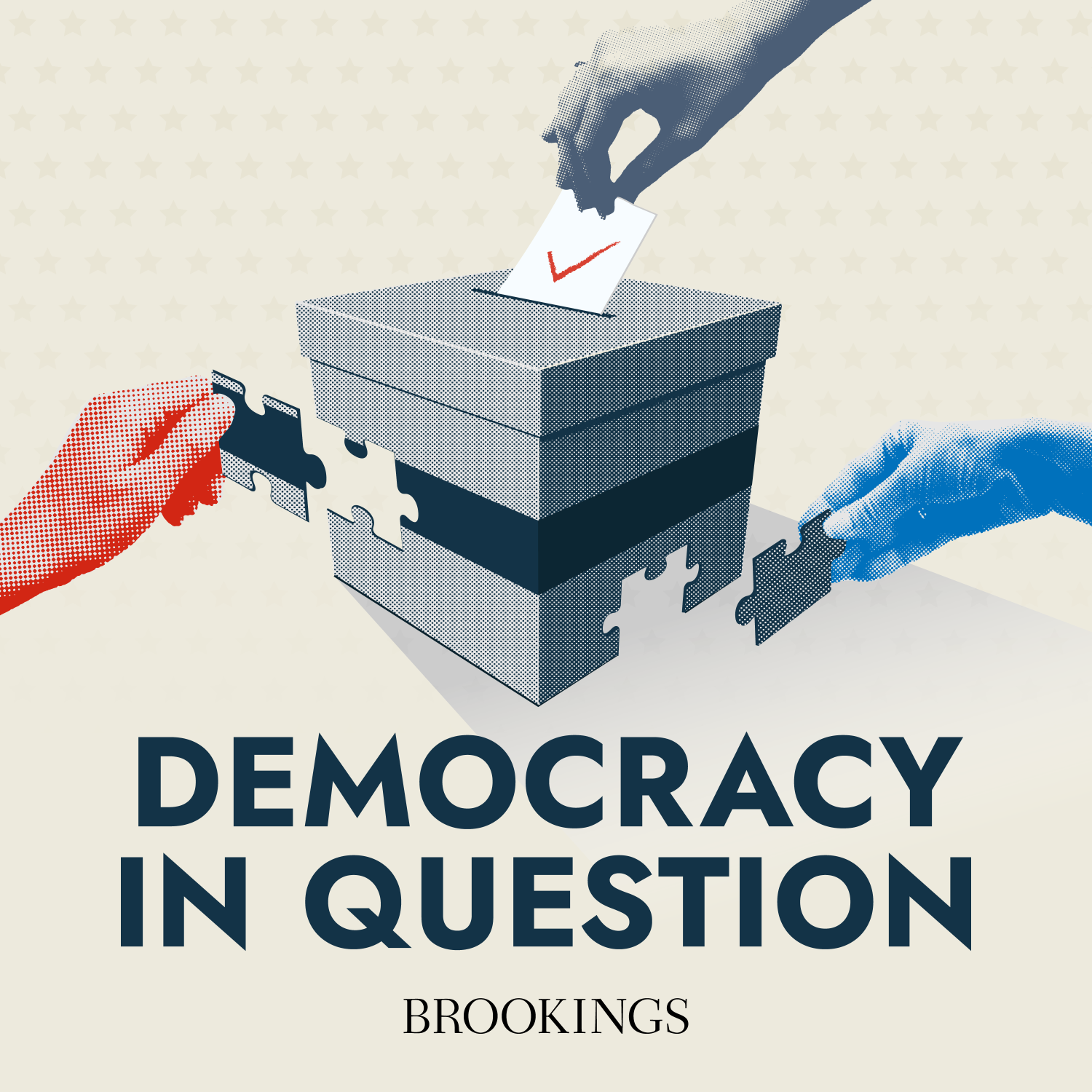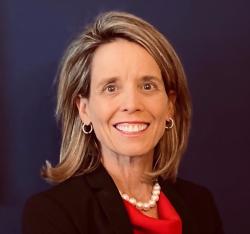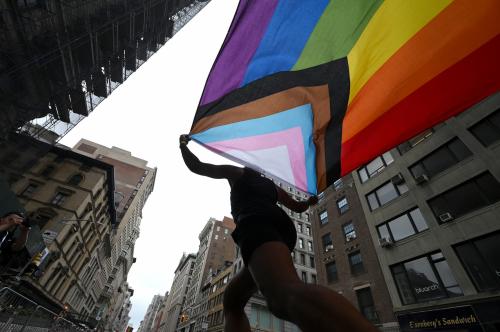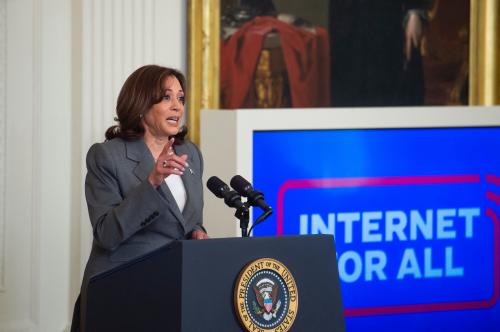[W]e have under-invested in civics education and social studies for decades, leaving many young people ill-equipped to understand, contextualize, and respond to many of the crises of our democracy that we see unfolding today.
Rachel Perera
Over the past two decades, civics education in the U.S. quietly faded into the background as schools shifted focus to STEM and reading—especially after the early 2000s, when the No Child Left Behind Act prioritized standardized testing in math and reading. Fast forward to 2025, when actions by the Trump administration aimed at dismantling the Department of Education have raised new issues around civil rights and preserving civics instruction. In this episode, host Katie Dunn Tenpas and guest Rachel Perera, a fellow in the Brown Center on Education Policy, discuss how civics education goes hand-in-hand with creating an engaged citizenship. Perera argues that a strong public education system is necessary for a healthy, functioning democracy.
- Listen to Democracy in Question on Apple, Spotify, or wherever you like to get podcasts.
- Watch episodes on YouTube.
- Learn about other Brookings podcasts from the Brookings Podcast Network.
- Sign up for the podcasts newsletter for occasional updates on featured episodes and new shows.
- Send feedback email to [email protected].
Transcript
[music]
TENPAS: Hi, I’m Katie Dunn Tenpas, a visiting fellow in Governance Studies at the Brookings Institution, and director of the Katzmann Initiative on Improving Interbranch Relations and Government. And this is Democracy in Question, a podcast where we examine current events through the lens of America’s political foundations, thinking about how recent events fit into the broader stream of democracy that runs throughout our history. You can find episodes of this podcast at Brookings dot edu slash DemocracyInQuestion, all one world.
Today, we’re diving into the question, does civics education make more engaged citizens? We know that school experiences shape how young people come to understand power, rights, and their role in society. For generations, education has powerfully shaped how Americans participate in democracy. Remember standing to recite the Pledge of Allegiance when you were a child?
In this episode, we are unpacking the deep and often overlooked nexus of education, civic engagement, and democracy in the United States. From curriculum fights and book bans to reprogramming public education dollars to private and charter schools, the classroom has become a front line in today’s cultural and political battles. This isn’t just about what students are taught. It’s about how and where they’re being taught to understand and participate in democracy itself.
And recent developments have only intensified these dynamics. In March 2025, President Trump signed an executive order to dismantle the Department of Education, shifting power to states and agencies with little federal oversight. Around the same time, the Department’s Office for Civil Rights issued new guidelines banning the use of race in education decision-making, gutting many DEI efforts across the country, which have been under pressure from the White House since day one.
Joining me to explore all of this is Rachel Perera, a leading voice on education policy. She’s a fellow at the Brown Center on Education Policy and holds the Robert and Virginia Hartley Chair in Governance Studies at Brookings. Her research focuses on racial and socioeconomic inequality in K through 12 education, civil rights, school discipline, and the broader politics of education policy, from charter schools to school boards. Rachel, thank you so much for joining me.
PERERA: Thanks for having me, Katie.
TENPAS: Yeah, so why don’t we just start with that opening question. What about this relationship between civics, education and democracy?
[2:47]
PERERA: We know that a strong public education system is a necessary condition for a healthy functioning democracy. And public education in the U.S., from K-12 to higher education, is under attack. And those attacks have only escalated since President Trump took office in January. And what’s worse, when we think about the importance of public education for democracy, is that we have under-invested in civics education and social studies for decades, leaving many young people ill-equipped to understand, contextualize, and respond to many of the crises of our democracy that we see unfolding today.
TENPAS: And when you talk about civics education declining, did it come at the cost of something else? Was there an emphasis on STEM education or why was there the shift? And if you could talk a little about when that shift may have occurred.
[3:36]
PERERA: So the declining investment in civics education and social studies has come alongside an increasing investment in STEM—science, technology, engineering, and math—and reading. And a lot of that increase in investment in science and reading and mathematics happened around the early 2000s with the passage of the No Child Left Behind Act of 2002. This was a federal piece of legislation signed into law by George W. Bush, which greatly expanded what we think of today as accountability in public schools and created, by lots of metrics, an increasing emphasis on reading and mathematics. Those were the scores that public schools were held accountable for in these accountability systems that were created by this piece of federal legislation in 2002.
TENPAS: So you would probably track the decline in civics education to around the early 2000s going forward?
PERERA: That’s right.
TENPAS: So even when Democrats were president, so President Obama from 2009 to 2016 or ‘17, and then President Biden’s recent term, did those administrations do anything to bolster civic education?
[4:42]
PERERA: Well, in 2015, President Obama signed into law the Every Student Succeeds Act, which was a reauthorization of the Elementary and Secondary Education Act, and the No Child Left Behind Act of 2002 was another reauthorization of that same. This is sort of the key law in K-12 education. And so the Every Student Succeeds Act that President Obama signed into law pulled back on a lot of these federal accountability measures. So really sent a lot of decision-making back to states.
We had seen a great expansion of the federal role in the early 2000s, and by 2015, a lot of people across the country at the local and state level and at the federal level were very frustrated with the accountability systems that had been set up through that 2002 law. And so, President Obama really tried to walk this back.
But by then, a lot the infrastructures and emphasis on reading and science and math, I would argue, had become so ingrained that we haven’t gone back to any type of pre-early 2000s equilibrium where there was sufficient or more equal emphasis on social studies and civics relative to reading and math.
TENPAS: I imagine it varies state by state, so there could in fact be a state like Idaho or something where they do emphasize civic education and it’s at the state level and the requirements come from state law as opposed to federal law. Is it possible that that could happen and are there any states that have chosen to of continue to pursue civics education?
[6:07]
PERERA: Yeah, that’s right. So in the U.S., education policy is, by and large, a local and state issue. The federal role in K through 12 education policy is very narrowly defined. Despite the rhetoric from President Trump and Secretary McMahon about sending education back to the states, that’s where education decision-making already happens. And so you do see some states invest more in different areas. We know for Massachusetts, for example, they were an early adopter of something called Action Civics, which was a curriculum that really focused on sort of service learning and helping young people get out into the community, diagnose a problem, design a solution, and try to advocate for that piece of legislation with their local legislators, with their local councilmen. And so we’ve seen some innovative approaches to civics education.
But the other piece of context that’s important to keep in mind here is that civics’ education, like the teaching of history and social studies more broadly, has become highly politicized over the last five to 10 years. And so as these topics and as these different areas of school curriculum get politicized, we know from lots of surveys that teachers will start to self-censor, and they will start to teach the sort of bare minimum to meet the state standards for what they have to teach. But they become very hesitant in terms of adopting anything that seems politically charged.
TENPAS: And can we back up just a little bit? Maybe you can sort of tell me a little bit about some of the empirical research out there that suggests that there is a relationship between having been educated about civics and understanding how democracy works and then subsequently being more engaged and involved in our political system?
[7:46]
PERERA: I’m not that familiar with the civics ed literature, but we do know that the more educated you are, the more you engage in democratic processes like voting. We know that there’s a close connection between the level of education that you attain and how you participate in our democratic processes. And we also know that certain approaches to civics have been shown to be more effective in terms of improving young people’s understanding of our democratic institutions and processes and their responsibilities as a citizen.
But I would say there’s been insufficient research, which in part is due to a lack of investment and a lack of, again, a lack of emphasis on civics education. There’s been insufficient research connecting different types of civics education approaches with some of these long-term outcomes. Because even at the federal level, education research has had a very narrow focus on student test scores for a very long time. And so measuring other outcomes has become less common in the education research space, I think to the detriment of our broader understanding of the different ways that different types of school practices and policies matter for a range of outcomes. Not only test scores and career and college outcomes, but also these more democratic and social outcomes that we know matter for the health of our democracy.
TENPAS: And to bring the conversation just a little bit more current and maybe to just explain to some of our listeners, what is the significance of President Trump’s wanting to shut down the Department of Education? Can you tell us a little about prior to this administration and when it was created during the Carter administration, what was the fundamental purpose? If state and local officials are responsible for education, tell us about the fundamental purposes and what kind of consequences there might be to closing it.
[9:35]
PERERA: Yeah, that’s a great question. And it’s been something I’ve been trying to emphasize as I’m talking to people about these debates around dismantling the Department of Education. So the federal role in K-12 and higher education was greatly expanded during the Great Poverty Program during the Johnson administration. So in 1965, we have the Elementary and Secondary Education Act, which introduced the Title I program, which is the largest source of federal funding that goes directly to K- 12 schools. And it largely goes to schools in poor communities. So it’s intended to make up for areas where states and local communities were underinvesting in their schools.
A year prior, in 1964, the Civil Rights Act was passed. And there’s a component of the Civil Rights Act, Title VI, which prohibits any institution that receives federal money from discriminating on the basis of race. So the introduction of Title I and having Title VI on the books was this new lever that the federal government used to school districts across the country to desegregate, to stop discriminating on the basis of race.
In 1965, you also had the Higher Education Act, which introduced the Pell Grant Program, which provides grants to students who are from low-income backgrounds. You also had the creation of the Student Loan Program. And so you see the beginning of an expansion of the federal role in the 1960s that continues on throughout the ‘70s.
In the ‘70s, you get the Individuals with Disabilities Education Act, which mandates that states provide educational services to students with disabilities. Prior to IDEA, the Individuals with Disabilities Education Act, children with disabilities did not have access to public schools.
And so as the federal role continues to expand through additional legislation, there was a sense in Washington that there were too many administrative agencies who had their hands in schools. So schools were having to deal with what was then called the Health, Education, and Welfare Agency. They also had to navigate the Department of Agriculture. From the perspective of local education leaders and state education leaders, they were having to navigate dealing with multiple different agencies across the federal bureaucracy.
And so one of the reasons, or one of ideas behind a creation of a separate Department of Education was to bring all of these different education programs and education offices that were having a hand in state and local decision-making under one umbrella. So that way there was sort of more streamlined work and ideally more coordination across these offices, right? So if you’re asking a state or a school district to send data, you can use that data for other purposes instead of asking them to send it twice to different agencies. And so that was some of the initial thinking behind creating a new federal agency in the Department of Education.
But it’s important in this conversation, again, to underscore that the federal role began to expand about 15 years prior to the creation of the department. And many of these federal programs and federal laws that the federal government enforces in local public schools and colleges and universities predate the creation of the department.
TENPAS: It sounds like the 1960s was really a pivotal moment for American education, am I right?
[12:33]
PERERA: That’s right. So in 1954, we have the historical decision in Brown v. Board of Education that ended segregated schools. But there were very few mechanisms by which the federal government could actually enforce this ruling. And so you had about a 15-year period of massive resistance and very little progress in integrating schools. It wasn’t until the passage of the Civil Rights Act and the introduction of Title I where you were holding this huge pot of money for schools in the rural South and saying you can have this money but only if you stop discriminating on the basis of race. And so it was the expansion of the federal role that is largely responsible.
And I should also mention that the passage of the Civil Rights Act gave the federal government some additional tools by which they can more proactively intervene in school districts that were not desegregating at the time. And so it was, you know, all of these pieces of different legislation together that were responsible for the integration of the American school system, not the Supreme Court decision alone.
TENPAS: And so if if that department is being dismantled, does that mean they will spin off these various programs to HHS and to other departments? I guess you’re monitoring this very closely, but do they have a plan?
[13:52]
PERERA: So there’ve been some discussions of a plan. There’s some details in Project 2025 in the education chapter. And a lot of what we’ve seen on federal education policy so far suggests that Project 2025 in fact was a blueprint for what they intended to carry out in this administration. And so, yeah, some of the plans that they have outlined suggest moving some of these functions to different agencies, to HHS—Health and Human Services—to DOJ when we’re talking about the Office for Civil Rights, moving that over to the Department of Justice.
But it’s important to keep in mind in this current discussion that any reallocation of these functions would need congressional approval. It would need an act of Congress. So in the piece of legislation that created the Department of Education in 1979, Its functions were very clearly outlined. And so those offices were created by that piece of legislation. And so reorganizing it would require an act of Congress.
TENPAS: Don’t they also have to pass a bill that dismantles DOE too?
[14:48]
PERERA: Right. They would have to pass a bill dismantling the department and they would have to pass a bill dispersing its functions and specifying what agencies were intended to take on which programs and enforcement of which federal laws.
And so I am very skeptical that we will see any congressional action along these lines. To get through the Senate you would need 60 votes. And dismantling the Department of Education is not something that polls well. I don’t have the polling numbers in front of me, but I feel very confident in saying that you would not get any Democratic votes on this, and if that’s the case, then this isn’t going to get through Congress. And so I think what we’ve seen instead are pretty significant efforts to undermine the work of the department absent getting Congress to weigh in.
TENPAS: Right, by the layoffs and things like that.
PERERA: Right. So we’ve seen at this point, relative to January, the Department of Education is at half its staff, as is many of its key offices, like the Office for Civil Rights, which enforces federal civil rights laws in all public schools and most colleges and universities. And so with this reduction in staffing at the department, we are already seeing key programs not working as they should be, not working as they were congressionally mandated to work. We’re seeing money that’s congressionally mandated not flowing out to states in the ways that it should. And so I think about a lot of these actions as a way to get around the fact that Congress is very unlikely to dismantle the Department of Education. And so what we’ve seen from the administration so far are every effort to try to undermine its work through other means.
TENPAS: Right, it’s kind of, they’re letting it die on the vine.
PERERA: Exactly. And I think they’ve gotten a bit creative with it, and we are not going to see or really feel the implications of their actions for at least a few months, if not years, right? One of the things they’ve done is they’ve fired almost everybody who works in the National Center for Education Statistics. They manage all of these huge federal data collection efforts, which are how we know anything about anything when it comes to public schools in the U.S. Our public education system is very diffused, it’s very local. And so without these big national data collection efforts, we would be guessing in the dark around how many kids are even in schools, let alone being able to measure things like how segregated our school systems are or how much inequality there are between our school systems or between states.
And so they fired all of the contractors, and they fired the people who work in this office. And so they’re saying that they’re going to do these things because many of these federal data collection efforts are congressionally mandated. But I have a very hard time imagining how you could pull off these very labor-intensive, operationally complex data collection efforts without the staffing levels you had before. Staffing levels, which by the way, were often very lean to begin with. And so if we don’t have these data, then we’re not even going to be able to assess or measure the impacts of many of the Trump administration’s actions on the public education system, because we are not collecting that data, and so—
TENPAS: There’ll be a huge gap for future scholars down the road.
PERERA: Right, exactly.
TENPAS: So Rachel, in light of your overview about the dismantling of the Department of Education and how pivotal those programs are, could there be a paradoxical reaction in terms of civics education so that maybe formally, students are getting less formal civics education, but certainly what is happening at the national level is trickling down so that students so many people are affected by it that perhaps that enhances their understanding of how American government works?
[18:19]
PERERA: Yeah, definitely. You know, if I’m trying to have an optimistic point of view that day, I definitely see that as the silver lining of so many of the debates around dismantling the Department of Education. Something that’s become clear to me in these conversations is that at the start, people did not understand the role of the federal government, how narrowly defined it was, and that most education policy happens at the state and local.
And so through this, I hope and imagine that many students and young people will come to have a greater understanding of how our federal government works, why key programs work the way that they do, what happens if they go away, like the real life implications of threats to those programs and the enforcement of certain federal laws. And so, again, my hope is that this really brings into stark relief what the federal role is and why this federal role is so important on some of these dimensions.
TENPAS: Right, and maybe it results in a sort of a more active set of citizens that want to be engaged and really are fighting for what they believe in. And so the democracy in the end comes out even stronger.
PERERA: Yeah, that’s certainly the hope.
TENPAS: So switching gears a little bit, I always like to ask my guests, if they were teaching high school students about democracy, what’s one lesson that you would want your students to leave with? And it can be in light of this education conversation or anything that you’ve thought about.
[19:39]
PERERA: Yeah, this is a great question. And I think the one lesson that I would want to leave students with is that democracy is local. I think especially in this moment, as there is so much activity happening in the federal bureaucracy and at the national level, it’s easy to think of democracy as happening at midterm elections and at a presidential election. But so much policymaking happens at the local and state level, this is especially true about education. So if you care about the attacks on public education, if you care about strengthening public education, those are largely matters of state and local policy. And so you should be paying attention to your state legislators. You should be paying attention to your local school boards. Go vote in your local schola board elections. Go to a local school board meeting. Those are incredibly powerful. Those are an incredibly powerful local bodies that do not get sufficient attention and do not get sufficient engagement. And I believe that that local policymaking and that state policymaking can be made better by more engagement from the public.
TENPAS: And they oftentimes show after those elections how tightly the victor won or lost. It’s something where your vote really does matter. And you can see it, it’s not, there’s not large margins. And I think that’s a great message.
PERERA: Yeah, exactly. And they’re not large margins, and turnout is often really low, which means that just small changes in turnout can dramatically influence the outcomes. And so you can have a significant outcome in your local school board election by getting five friends to vote.
TENPAS: It’s like a super vote.
PERERA: Right.
TENPAS: Well, Rachel, thank you so much for coming today and to explaining these issues that on their face, you know, it kind of seems straightforward, but they’re so much more nuanced, and your background and your research has really helped us understand it. So thank you.
[music]
PERERA: Thanks so much, Katie.
[music]
TENPAS: Democracy in Question is a production of the Brookings Podcast Network. Thank you for listening. And thank you to my guests for sharing their time and expertise on this podcast.
Also, thanks to the team that makes this podcast possible, including Fred Dews, producer; Daniel Morales, video manager; Steve Cameron, audio engineer; the team in Governance Studies including associate producer Adelle Patten, plus Antonio Saadipour and Tara Moulson; and our government affairs and promotion colleagues in the Office of Communications at Brookings. Shavanthi Mendis designed the beautiful logo and show art.
You can find episodes of Democracy in Question wherever you like to get your podcasts and learn more about the show on our website at Brookings dot edu slash Democracy in Question, all one word.
I’m Katie Dunn Tenpas. Thank you for listening.
The Brookings Institution is committed to quality, independence, and impact.
We are supported by a diverse array of funders. In line with our values and policies, each Brookings publication represents the sole views of its author(s).








Commentary
PodcastDoes civics education make more engaged citizens?
Listen on
Democracy in Question
May 8, 2025